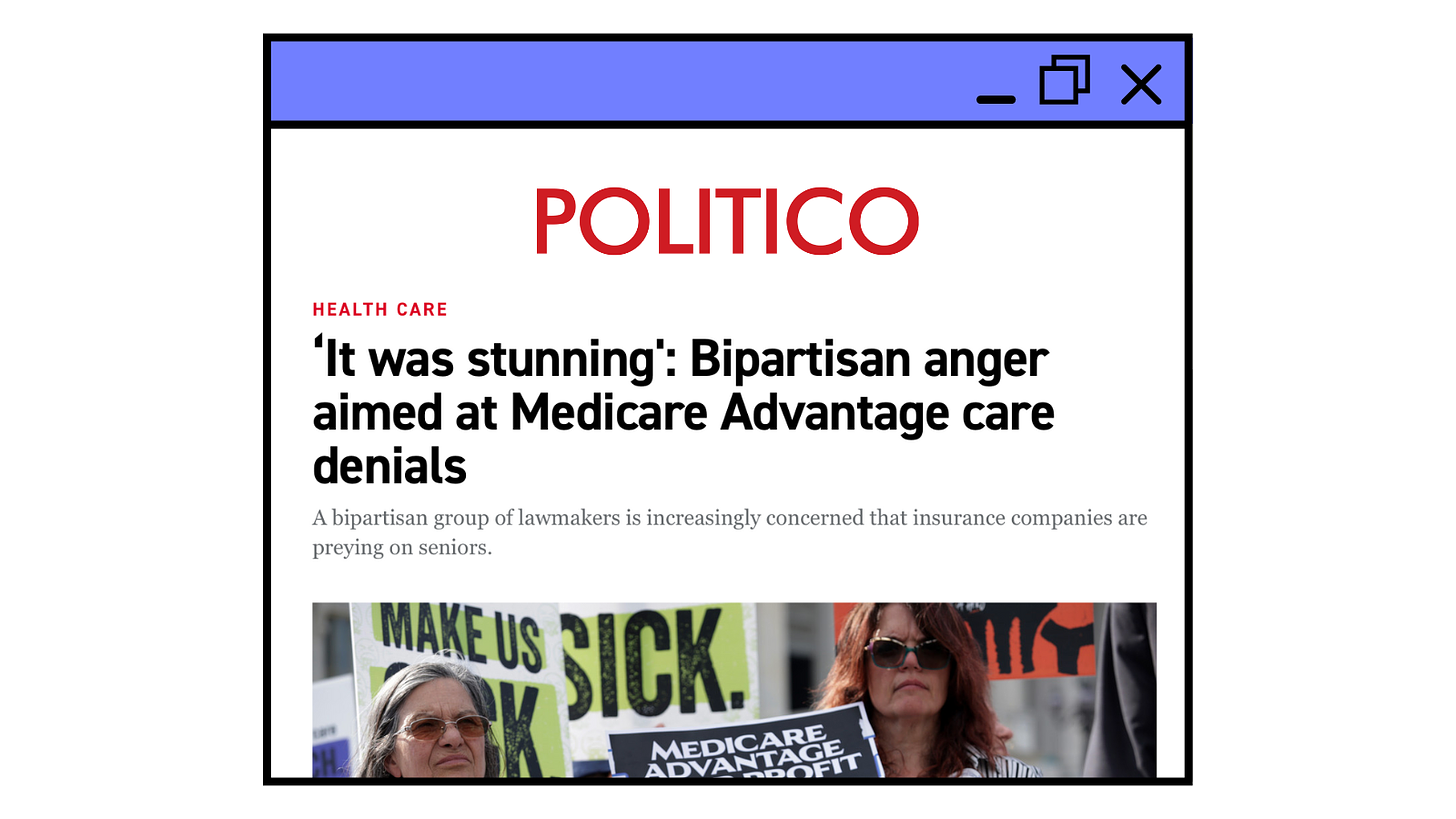

Discover more from HEALTH CARE un-covered
BETWEEN YOU AND YOUR DOCTOR: How Medicare Advantage care denials affect patients
As UnitedHealth wracks up unprecedented profits, the people it insures battle for care.
In 2023, insurance behemoth UnitedHealth spent $8 billion buying back its stock to juice its stock price—and its executive compensation, which is tied to the company’s stock price. It spent 39% more on stock buybacks in 2023 than in 2022. In 2023, It also spent $6.7 billion on dividend payments—a 10% jump from the prior year.
The company’s CEO, Sir Andrew Witty, pulled in nearly $21 million in 2022—a 13% hike from 2021. (His compensation for 2023 hasn’t been disclosed yet. Also in 2023, UnitedHealth spent $10.76 million lobbying Congress. That doesn’t count the trade groups it belongs to; it pumped $9.9 million into those memberships in 2022 and hasn’t released the latest numbers yet.
All of those reasons and more explain why Jenn Coffey, a 52-year-old former EMT in Manchester, New Hampshire, can’t get the medicine she needs to be able to enjoy life.
“UnitedHealth doesn't care about me,” Coffey said. “I’m a liability, I cost them too much money. They make a profit by not giving me the care I need. The company is in charge of deciding who does and doesn’t get care. My doctor says, ‘You need this infusion.’ UnitedHealth is standing in the doorway saying ‘No you don’t.’”
With 33 million enrollees, Medicare Advantage plans now cover more than half of all total Medicare beneficiaries. And while there are major concerns about the program’s cost—as much as $140 billion annually to taxpayers over Traditional Medicare—equally if not more concerning is the way MA plans often block access to care through “prior authorization.”
Prior authorization, which is rarely used in Traditional Medicare, is when an insurer inserts itself in the decision-making process between a doctor and a patient. It’s a practice that is supposed to reduce costs and assure appropriate care but is often used excessively by private insurers and frequently results in significant treatment delays.
Coffey has complex regional pain syndrome, a rare illness that typically emerges after surgery or a heart attack. One of the few effective treatments for CRPS is intravenous ketamine infusions. After numerous appeals, UnitedHealth agreed to expedite its prior authorization process for Coffey. But after paying for just one of her ketamine infusions, the company stopped paying and stopped expediting.
“I have to get a prior authorization before I go in for an infusion,” Coffey said. “It’s a never-ending nightmare with them. I didn’t ask to get complex regional pain syndrome. I paid into the system thinking it would be there for me. Now it’s not there for me. I get nauseated and horrible headaches from being on the phone for hours with UnitedHealth trying to get the care I need. But it’s my only option. My only other choice is to do nothing and let myself decay and die.”
UnitedHealth didn’t respond to a request for comment from HEALTH CARE Un-covered.
Representative Pramila Jayapal (D-Wash.), the chair of the Congressional Progressive Caucus, said in November that prior authorization “has turned into a process of basically just stopping people from getting care.” Senator Ron Wyden (D-Ore.) told Politico, “It was stunning how many times senators on both sides of the aisle [during a recent Congressional hearing] kept linking constituent problems with denying authorizations for care.”

In February 2023, researchers from KFF, a health policy think tank, estimated that there were 35 million prior authorization requests in 2021, the most recent year for which data was available, and two million of the requests were denied. Only 11% of the denials were appealed, but of 82% of the denials that were appealed, the original denial was overturned. A rough estimate would suggest that there are as many as 1.5 million improperly denied Medicare Advantage prior authorizations in a given year.

The number is likely to continue to grow. As I reported for The Lever last year, the two million denials in 2021 represented a massive escalation from the 640,000 in 2019 as estimated by the Inspector General for the Department of Health and Human Services.
The Centers for Medicare and Medicaid Services (CMS) doesn’t currently track denials by Medicare Advantage plans in any sort of systematic fashion or publish plan-specific data on denials. That’s why in December a bipartisan group of senators led by Elizabeth Warren (D-Mass.) pushed CMS Administrator Chiquita Brooks-Lasure to begin collecting data on prior authorizations. In January, CMS released a set of technical rule changes to prior authorization, that should improve practices somewhat. The changes, however, do not include drugs in the requirement to report data on prior authorization denials, thus excluding a huge potential dataset that would allow consumers to make more informed choices about their Medicare Advantage plan. They also don’t include cases like Coffey’s in which UnitedHealth is refusing to cover the cost of her ketamine infusions. CMS did not respond to a request for comment from HEALTH CARE Un-covered.
Even with at least two million prior authorization denials annually, UnitedHealth could be taking steps to further restrict care in its Medicare Advantage plans. In a financial filing from February 2023, UnitedHealth complained about the Biden administration’s decision to slow growth in Medicare Advantage payments, saying the moves by CMS would fall “well short of what is an increasing industry forward medical cost trend, creating continued pressure in the Medicare Advantage program.” The company said that as a result of the administration’s actions, it might “seek to intensify our medical and operating cost management, make changes to the size and composition of our care provider networks, adjust member benefits and implement or increase the member premiums supplementing the monthly payments we receive from the government.” In other words, instead of suspending stock buybacks and dividends for shareholders, it will consider reducing benefits and making enrollees pay more.
Bill Kadereit, the director of the National Retiree Legislative Network, said insurers’ aggressive use of prior authorization can be lethal. “The bigger issue is the request for approval for a procedure,” he said. “The time factor is as much of an issue as the fact that a service is denied. People can die in the interim.” In October 2023, the Medical Society of the State of New York released a survey showing that 94% of surveyed physicians found that prior authorization delayed care and 89% reported that excessive prior authorization had negative clinical impacts on patient outcomes. This followed a March 2023 survey by the American Medical Association which found that one in three doctors said prior authorization had led to a serious medical event, ranging from hospitalization to death or permanent disability.
Coffey has been working with People’s Action, a national network of community organizing groups, to resolve her care crisis. They’ve made progress: UnitedHealth has paid for one ketamine infusion and has agreed to continue paying for them.
People’s Action was also able to help 30-year-old Carly Morton of Beaver, Pennsylvania, get the care she needed. Morton has MALS, or median arcuate ligament syndrome, a disease that can cause severe stomach pain. The only cure for it is open-stomach surgery. For months, UnitedHealth refused to pay for the surgery her doctor requested.
“The pain got worse and worse and worse,” she said. “I was on a feeding tube because I couldn’t eat. There weren’t surgeons in the state who had the qualifications to do the surgery. I have a high risk of dying in the next five years. Getting off the feeding tube greatly increases my chance of thriving. The only other option is to disintegrate into weakness. UnitedHealth was denying the surgery because it was out-of-state.”
Morton said UnitedHealth had crafted a byzantine set of regulations that was impossible for her to maneuver through. “I’m not unintelligent. The way they have the system set up makes it impossible to navigate.”
Despite repeatedly contacting UnitedHealth as her condition was deteriorating, “I had gotten nowhere. I was desperate and at a point that I had no hope,” Morton said.
But at that nadir, Morton was made aware of People’s Action’s campaign to hold Medicare Advantage insurers accountable.
“Once I started working with them, they had advocates and a lawyer experienced in the insurance industry,” and things finally began moving. Among other things, People’s Action launched a petition with more than 2,800 signatures. But even then, her hurdles were not overcome.
“Even once I understood things more and People’s Action got involved, it was so much work to get the paperwork saying that I was approved,“ she said. It was ridiculous, and I was in so much pain.”
Now, eight months after her surgery, Morton said, “It’s a world of difference. I’m off the walker and the feeding tube. I’m weightlifting. I’m so much healthier. My life is completely different.”
The logic behind People’s Action’s work is to use individual cases like Coffey’s and Morton’s to spark broader change across the entire U.S. health care system.
“We are shedding light on the way Medicare Advantage insurers are denying care and the way that those care denials impact people’s ability to live the healthy lives they deserve and in turn juxtapose it with the profits these companies are taking home,” said Aija Nemer-Aanerud, the director of People’s Action’s Health Care for All campaign.
“We’re organizing folks around the country to fight back against unfair claim denials. And that’s an opportunity to organize a lot of folks who are not yet politicized around the need for a public health care system.”
Meanwhile, despite Morton’s success, Coffey, the former EMT, is still fighting to get the care she needs and deserves.
“I have the one doctor in the state of New Hampshire capable of giving me life-saving treatment,” referring to the ketamine infusions. “If UnitedHealth doesn’t pay him and he closes his doors, where do I go?”
Subscribe to HEALTH CARE un-covered
Pulling back the curtains on how Big Health is hurting Americans and how we got to this point.






What has happened to patient care? Everyone thinks the profiteering motive is something good, but there are at least 10,000 patients who die from readily preventable conditions because of denials of care, delays in care, and overcharging the Medicare Trust Fund to the tune of $400 billion dollars per year. Healthcare is a Human Right. Paying Patients are NOT EXPLOITABLE commodities to be discarded like trash. These are violations of what Medicare Advantage and Traditional Medicare are all about . The excessive Capitalism is an international embarrassment. Saying the USA has the World best medical care is a sick joke! Our politicians collaborate with the insurers, Big Pharma, not for our benefit, but for their own acquisition of wealth.
I am an RN and literally the system is totally broken.